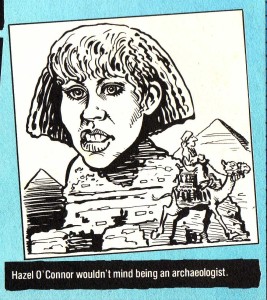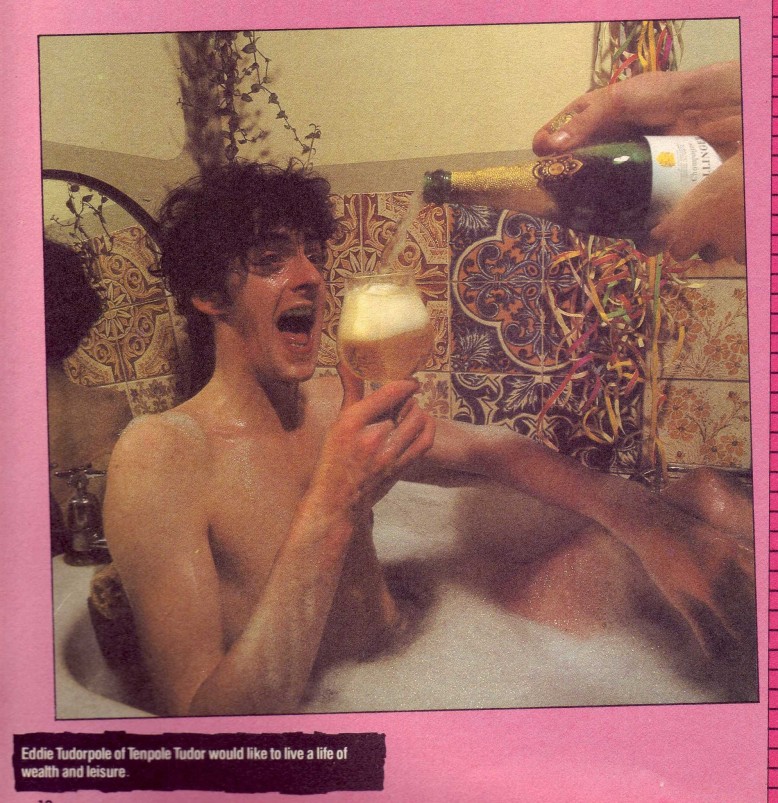 Look-In Pop Annual, edited by Neil Tennant, ITV Books, 78pp, 1982
Look-In Pop Annual, edited by Neil Tennant, ITV Books, 78pp, 1982
If ever I’m asked the question about which is my favourite book on pop music, my answer is still a title which I read long before I thought about setting up The Pop Music Library.
Pet Shop Boys, Literally is journalist Chris Heath’s account of the band’s first live shows in Asia and Britain in 1989, together with their history to date and much in the way of theorising about pop music more generally by Neil Tennant and Chris Lowe. The book was published with the band’s full agreement, but is a more revealing portrait than their endorsement may suggest. By turns, the band are depicted as impatient, funny, clever, irritating and thoughtful. Even Tennant and Lowe, writing the introduction to Literally, sound surprised as to how they might appear in the book: “Are we that self-obsessed, so frequently rude? Do we discuss money, snipe about pop stars quite so much? Apparently, yes.”
Given that Neil Tennant in particular has much to say about the contemporary pop scene in Literally, I was interested to see to what extent I could detect his opinions as editor of the Look-In Pop Annual (published in 1982, and therefore prepared in time for the year ahead, 1983). Tennant’s work at ITV Books, this annual included, had followed spells at Marvel Comics and Macdonald Educational Publishing and preceded his celebrated editorial roles at Smash Hits, the first of which he began later in 1982. Tennant first met Chris Lowe in 1981 and they recorded their first demos in 1982 as well, so however much or little job satisfaction this publication might have given its editor, there was a fairly remarkable future lying just ahead for him.
Appropriately enough, the first article in the annual is a very good summary of the history of synthesisers and computerised music, which gives due credit to Dr Robert Moog, Karl-Heinz Stockhausen and Walter Carlos. The piece is by Dave Rimmer, who would later write at length about Culture Club and what came to be known as the New Pop of the early eighties in his book Like Punk Never Happened. For anyone who has been watching the recent BBC4 repeats of 1982 editions of Top of the Pops, the New Pop acts who make up the bulk of this annual will be very familiar: Altered Images, Haircut 100 and Bucks Fizz appear in multiple sections, extravagantly hair-sprayed and with full must-have details about bandmembers’ places of birth, height and eye colour.
 On the evidence of this annual at least, ‘New Pop’ is well-named as there is a clear attempt to distinguish the perky newcomers from the old lags of the scene. One section is actually titled ‘The Old-Timers’ and covers acts who have managed to sustain careers beyond their first successes. Step forward Cliff Richard, Paul McCartney, David Bowie and even ABBA, who had had their first hit single only eight years before this book was published. Elvis Presley appears in his own chapter, with his early career rendered in eight pages of black and white line drawings by the artist Arthur Ranson (the full story of Presley’s career had previously appeared over multiple editions of the weekly Look-In magazine in 1981). It’s beautifully done, but even the method of presentation seems to locate the singer in another era entirely.
On the evidence of this annual at least, ‘New Pop’ is well-named as there is a clear attempt to distinguish the perky newcomers from the old lags of the scene. One section is actually titled ‘The Old-Timers’ and covers acts who have managed to sustain careers beyond their first successes. Step forward Cliff Richard, Paul McCartney, David Bowie and even ABBA, who had had their first hit single only eight years before this book was published. Elvis Presley appears in his own chapter, with his early career rendered in eight pages of black and white line drawings by the artist Arthur Ranson (the full story of Presley’s career had previously appeared over multiple editions of the weekly Look-In magazine in 1981). It’s beautifully done, but even the method of presentation seems to locate the singer in another era entirely.
 What also comes across in the annual’s coverage of pop acts is an attempt to portray them, for all their glitzy showbiz trappings, as essentially just like us. For example, a map of the British Isles shows us which parts of the country different bands are from, so that we can match our own geographical location with theirs; another section tells us about the alternative careers certain pop stars might have had; and in an account of the Pop Panel, where “ten lucky Look-In readers” get to grill a couple of top popsters, we find out that Gary Numan lives on a golf course but doesn’t play, and that Cheryl Baker prefers “snooker and darts on the telly” to the football.
What also comes across in the annual’s coverage of pop acts is an attempt to portray them, for all their glitzy showbiz trappings, as essentially just like us. For example, a map of the British Isles shows us which parts of the country different bands are from, so that we can match our own geographical location with theirs; another section tells us about the alternative careers certain pop stars might have had; and in an account of the Pop Panel, where “ten lucky Look-In readers” get to grill a couple of top popsters, we find out that Gary Numan lives on a golf course but doesn’t play, and that Cheryl Baker prefers “snooker and darts on the telly” to the football.
 The future Pet Shop Boy has a byline on just one article in the annual, a history of pop on TV. Here we find Neil Tennant expressing opinions as tellingly, if not quite as emphatically, as he does in Literally. He concludes that pop on TV in the 1960s was great – Ready Steady Go! is singled out for praise in particular – but that in contrast the 1970s had very little to offer. Lift Off was “a rather dull effort”, The Partridge Family was “corny” and The Old Grey Whistle Test was “pretty boring when it started in 1971” and today merely “plods along, greyer than ever.” I’ll close with some more pictures from the annual and Neil Tennant’s summary of 25 years of pop music on the box, and leave you to draw your own conclusions about how the writer of this paragraph might have gone on to make a little impact of his own in the new medium he describes during the years that followed:
The future Pet Shop Boy has a byline on just one article in the annual, a history of pop on TV. Here we find Neil Tennant expressing opinions as tellingly, if not quite as emphatically, as he does in Literally. He concludes that pop on TV in the 1960s was great – Ready Steady Go! is singled out for praise in particular – but that in contrast the 1970s had very little to offer. Lift Off was “a rather dull effort”, The Partridge Family was “corny” and The Old Grey Whistle Test was “pretty boring when it started in 1971” and today merely “plods along, greyer than ever.” I’ll close with some more pictures from the annual and Neil Tennant’s summary of 25 years of pop music on the box, and leave you to draw your own conclusions about how the writer of this paragraph might have gone on to make a little impact of his own in the new medium he describes during the years that followed:
On reflection, much of pop on TV has been something of a disappointment over the years, probably because the powers-that-be in television are often not very interested in what’s happening in the pop world, and anyway find it difficult to get a genuinely exciting atmosphere going in a television studio. However, it has provided some great moments and some real entertainment and the fantastic videos now being made to promote singles are constantly brightening up our television screens. Stay tuned!



